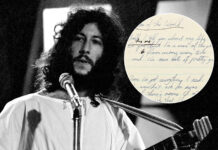
Meet Boko Yout: Sweden’s most interesting new band who approach guitar chaos with the mindset of a cinematographer
Boko Yout’s debut album needs all of three minutes to start falling apart in thrilling fashion. As the opener Volleyball Tournament strolls to its conclusion – one part Seal, another Ghostpoet, vocalist Paul Adamah’s melodies coiled and patient – there’s a sudden burst of noise, a blast of distortion and thudding, relentless percussion. Then it’s something else entirely. “When I first saw them they were very tight as a band, very in the pocket,” guitarist Lionel Turner says. “It felt like the right thing to do to add some chaos into that.”
Circling Adamah’s shapeshifting, concept-driven writing, Gusto makes good on this promise. Underpinned by a loose narrative that finds a fictionalised version of the vocalist in therapy sessions with the titular doctor, one moment it might be discussing identity or gig work, the next it might train its sights on perceptions of art from both inside and outside institutions or the push-pull between openness and self-destruction. It’s pointed and ambitious, reaching for what Adamah has described as “a sonic manifesto for living with love and intention.”
READ MORE: Meet Essence Martins – the YouTube-taught guitarist who’s choosing to master the instrument on her own terms
The accompanying sounds are a melange of motorik drums, needling bass and guitars that whirr and bite against verses with roots that run all the way back to lo-fi bedroom hip hop experiments and the joyous collaborative music that emanated from jams between local African musicians at Adamah’s childhood home in Örebro, where he was brought up by a Togolese father and Mozambican mother. Turner initially met Adamah through his day job as a cinematographer, but their parallel interests in music soon drew them closer together.
“He was rapping at the time,” Turner recalls. “One day he told me he was done with that and he wanted to start a band. He didn’t recruit me – we just had some sessions and we wrote some songs together, and that was that. We kept on living our lives. I thought he had this band, but it turns out that he had just created it in his head. It was something he was projecting towards the future.”
A musician since his teens, Turner grew up with a guitar in the house and his South American father’s love of 60s rock ‘n’ roll and cumbia ringing in his ears before stretching out into his own esoteric interests. Learning the ropes on bass first, he then tapped into the psychedelic wandering of Dungen’s Raine Fiske, the pedal manipulation of Stereolab’s Tim Gane and the searching ambient work of Tatsuhiko Asano.
Paul Adamah. Image: Mira & Thilda Berglind
From time to time Adamah would send demos his way, asking if he heard a guitar part. “I would try something out at home, and then maybe send him a video,” Turner says. In 2023, Adamah bit the bullet and asked him to be a part of Boko Yout. “He had already recruited some members but they just had one guitar player,” Turner says. “They were going to play in a big venue with Viagra Boys. That’s when I joined.”
Quickly, he fell into a collaborative process that put the songs at the heart of everything. There are multiple voices at play, with each of them bouncing back in a new form once they’ve reached someone else’s ear. Drummer Joel Kiviaho, who produced Gusto, plays some guitar on the record, including a section on 9-2-5 that was lifted straight from an iPhone note and dropped into the finished track, while Adamah’s writing has pushed Turner into spaces he might not have discovered on his own.
“Paul always has ideas,” he says. “He can come up with riffs that sound mad to me, at first, like they don’t make sense. I love that about his mind. We have a song called Teleprompter, which is a really strange riff to me. It doesn’t sit right in my hand, with the way I play. But it’s just fun. He’ll ask me, ‘Shit, should I study music theory?’ And I’m like, ‘Please don’t. Just keep doing what you’re doing.’”
In many ways, Gusto comes to life in the details. It’s about shifts in tempo and melody, with Turner particularly interested in how texture, noise and distortion might alter the way something is perceived by the listener. He’s a keen follower of Arto Lindsay, particularly the manner in which the no wave pioneer finds ways to thread something gnarly between elements that, outwardly at least, appear more conventional.
Here, that comes to the fore in moments such as the choppy, barbed accents on Boyfriend’s riff, or a string of outro solos that drag songs towards unexpected, feverish endings without losing a self-contained sense of directness.
“Texture is a key word to me,” he says. “That’s part of what makes music interesting, it’s tactile, you know? I’ve been going through so many different types of distortions and fuzzes – it’s like a never-ending exploration because there are so many combinations. I discovered so many things recording this album, from just changing cabs and guitars to changing the order things are in.
“I tried to have a clear idea of what I can contribute, and asked what the sound could benefit from. For me, it was texture, grit, and distortion. But it’s also a slippery slope. Once you start cranking up the volume, everyone wants to crank up the volume. I think that’s consumed us in a way. We let that consume us. I think this album has turned into a heavier sound than the first EP.”
Working largely at Kiviaho’s place, which has an “almost extended bedroom studio” feel, Boko Yout had time to delve deeper and deeper into this world. Completed on the album by bassist Kevin Stierne (Damien Kabran plays second guitar live) they spent time finding the right layers of grime to drive home Adamah’s messages. “As excited as I get, I think they all really like to experiment with distortion, too,” Turner says. “Especially Joel, he’s always asking me to put some fuzz on a song.”
Boko Yout. Image: Mira & Thilda Berglind
Turner started out with an interesting guitar in hand: a Victor SG-18, which was only manufactured for a short time by JVC in Japan during the 1960s. “But we started playing louder and more distorted, it started feeding back a lot live,” Turner laments. He turned instead to a Danelectro Dead-On ‘67. “That worked very well,” he adds. “It didn’t have a whammy bar, which I quite like to use, so I modded it and put one on. But I kept everything else original.”
Amps-wise, it was a case of adapting to their surroundings. When he needed to, while recording on tour or darting between studios away from home, Turner turned to sims such as the Universal Audio Dream ‘65, but the sound he hears in his head is often coming from another characterful piece of kit dating back to the time when the Beatles walked the Earth: a small-but-powerful Hagström 26. “That’s the sound that we prefer,” he says. “It’s like a typewriter, really portable.”
On his live board, he’s been racing through pedals, finding different things to love about equipment that forces him to learn on the fly. “I’ve been going through a lot of distortions but one keeper has been the Basic Audio Zippy,” he says. “That’s been great. Lately on tour I have been using a Fairfield Circuitry Roger That, which has been interesting, too. At times I’ve been trying out something called [Mattoverse] AirTrash – it’s very hard to control. I feel like my research is going towards those kinds of uncontrollable fuzzes. I love to be surprised by gear, to not always be on top of it, and sometimes have something that goes somewhere where I’m not ready for.”
Paul Adamah. Image: Mira & Thilda Berglind
In a project such as Boko Yout, where the music is largely propelled by the vision of one songwriter, the task for their bandmates is to find a way in. Turner takes that job seriously, almost leaning on the interpretive nature of his career in film to challenge and reconstitute concepts that carry great personal weight. That dynamic is one of Gusto’s greatest strengths. “When you get a script or a treatment, you need to find a way to tell that story in effective ways,” Turner says. “The fun part of cinematography is that you get to choose the texture, the media, the format.”
“It is pretty similar, playing guitar, because you have this palette of sounds,” he continues. “I don’t have a go-to way [of doing things]. I’m always thinking, ‘Okay, what should I use now?’
“I try to mix it up as well. I seldom use the same stuff on every song. We talk about the ideas that we want to bring to life to see if it makes us excited. That’s pretty much how you make films as well.”
Boko Yout’s Gusto is out on September 5 through Hoopdiggas Recordings.
The post Meet Boko Yout: Sweden’s most interesting new band who approach guitar chaos with the mindset of a cinematographer appeared first on Guitar.com | All Things Guitar.
Source: www.guitar-bass.net












